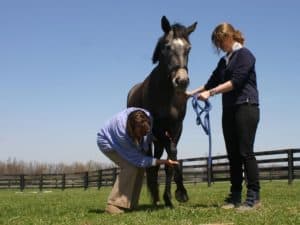Cosmetic Alteration Of Arabian Horses
- Topics: Article, Breeding Planning
The Arabian Horse Registry of America, Inc., has adopted the following statement on cosmetic alteration of Arabian horses:
In response to recent allegations that some purebred Arabian horses have been surgically altered to enhance their physical appearance, the Registry has adopted the following position: The surgical alteration of any Arabian horse for the sole or primary purpose of enhancing its appearance is an abhorrent practice not in the best interest of the Arabian breed.
In the unanimous view of the Registry’s Directors, Governing Members and professional staff, these practices should be condemned as an abuse of this noble animal. Moreover, cosmetic enhancements through surgery pose a clear threat to the future of the Arabian breed. Cosmetic surgical alterations (for example, liposuction, removal of muscle tissue, tattooing of eyes, and the like) may change the phenotype (appearance) of an animal. The genetic makeup of the horse remains the same, however. When used in a breeding program, the horse is incapable of passing on the cosmetically enhanced features but is reasonably likely to reproduce its genotype–the appearance it had before surgery.
Since the phenotype of any Arabian is so important in the selection of horses used to create future generations, the cosmetic alteration or enhancement of horses via surgical procedures undercuts this fundamental tool of breeders. Using altered horses or making them available to others in breeding programs presents abundant opportunity for mistakes, misunderstandings, or plain fraud if the prospective purchaser is not adequately informed that attractive features of the horse were produced by surgery, not by genetic expression
Create a free account with TheHorse.com to view this content.
TheHorse.com is home to thousands of free articles about horse health care. In order to access some of our exclusive free content, you must be signed into TheHorse.com.
Start your free account today!
Already have an account?
and continue reading.
Written by:
Press Release
Related Articles
Stay on top of the most recent Horse Health news with












